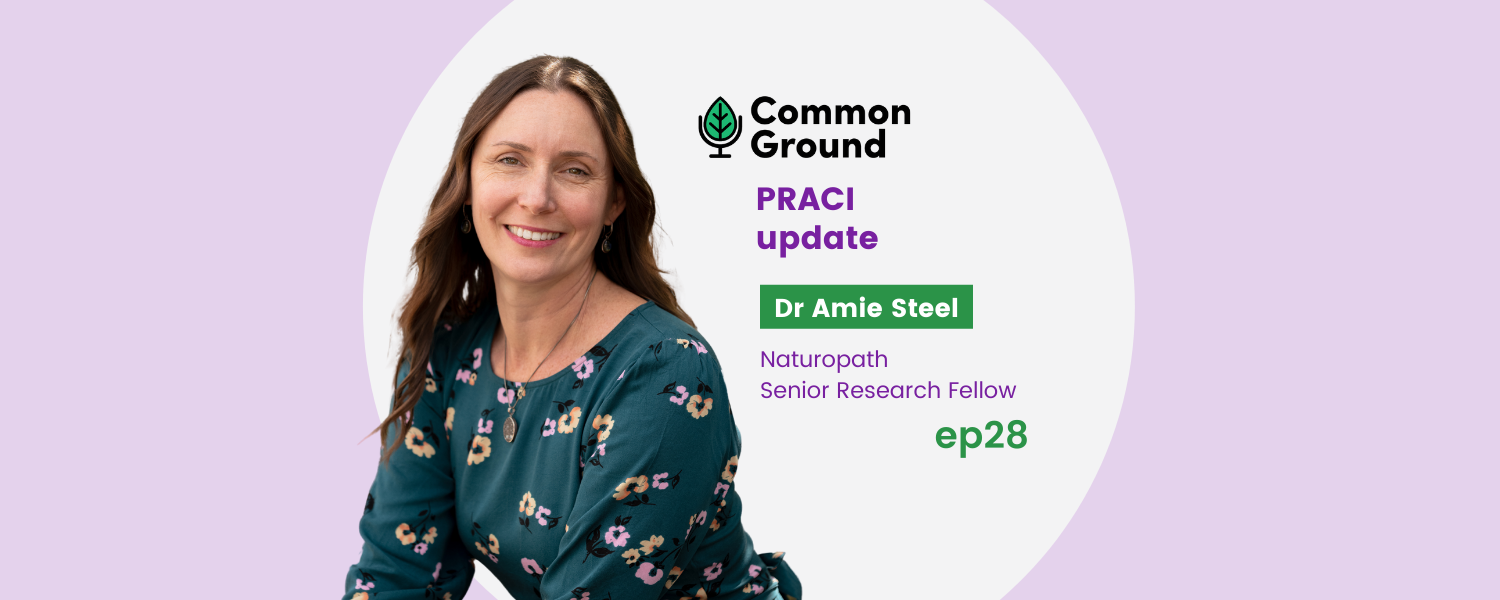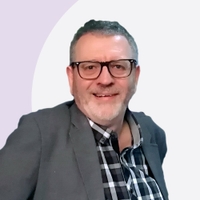
Listen on Amazon music | Apple Podcasts | Google Podcast | Spotify
Transcript
(0:03): Welcome to Common Ground, a podcast series discussing new research and interesting projects in the filed of complementary medicine. Hello, my name i sJacqui Fahey, Head of Education at vital.ly.
vital.ly is a digital platform, a health professional resource and distribution service all in one.
Firstly, I'd like to begin by ackowldeging the gadigal people of the Eora nation as the traditional custodians on the land on which we gather here. I wuold also like to pay my respect to their elders, both past, present and emerging.
Today on Common Ground I'll be discussing practice-based research networks (PRACI) with Dr. Amie Steel.
Dr Amie Steele is a naturopath and senior research fellow at the Australian Research Centre in Complementary and Integrative Medicine, University of Technology Sydney, and is ranked Australia's number one Complementary medicine researcher. She holds editorial appointments for a number of journals, has authored over 250 peer reviewed publications and edited three special journal issues and three research books. Her methodological interests encompass mixed methods, research implementation, science knowledge mobilisation, applied health services research, and practice-based clinic research.
Welcome back to Common Ground Amie!
Dr Amie Steel (1:20): Thank you so much, Jacqui. It's very exciting to be here.
Jacqui Fahey (1:26): Thank you Amie. What can you tell me about practice-based research networks (PRACI) and what makes PRACI so unique?
Dr Amie Steel (1:33): Well, to start with practice-based research networks (PRACI) are a kind of infrastructure that helps to connect clinicians who are out in the world, providing care to people in the community and researchers, and to allow important questions that are important and actually make sense in real world clinical practice to be investigated through research, but also for researchers to undertake their study, their work in settings that are actually relevant to the real world.
So it's bringing those two really crucial worlds together to make sure that the research that's produced is as applicable as possible and as meaningful as possible to the people who are on the ground who are most likely to use the new knowledge generated from that research. So that's the principles of them, but what they actually are is it is a network where you have a cluster, a group of clinicians on the ground who've agreed to be involved in some sort of research in the future and they connect with and are kind of held in the database by a research organisation and working with those researchers in that organisation to facilitate future research.
So it's kind of, I'd almost describe it as like a dating service for researchers and clinicians of providing an infrastructure and an opportunity for when researchers really want to study a particular topic or a condition or practice, then they have access to clinicians who have put their hand up and said ‘Look, I'm open to being approached to do research’, but equally those clinicians can have some confidence that the researchers who they are approaching have actually gone through a bit of a quality control and a vetting process, because if you're a clinician, you haven't got a lot of experience in research.
It can be really, you can be uncertain about whether or not the people conducting the research have got all the right checks and balances in place, and they're doing it with the right intentions in mind. And so the practice based research network administration helps to kind of vet those enquiries before they come through. So, a clinician can have some confidence that if they're being asked to participate in something it's something worth participating in.
Jacqui Fahey (3:50): Right, okay, and so what research has been produced so far from PRACI?
Dr Amie Steel (03:56): Well, PRACI is a complementary medicine practice-based research network, and it's actually the world's largest practice based research network for complementary medicine.
It's got the biggest in terms of the number of professions that it encompasses, and it's produced a whole bunch of research.
One of the unique features, because you sort of did ask me that before, I didn't really answer that question, but it taps into the sort of research we've produced. One of the unique features of PRACI and the way that ARCCIM ![]() has set up our PBRN
has set up our PBRN ![]() s, is that we set them up with the in a way that allows a lot of flexibility of research. The PBRN
s, is that we set them up with the in a way that allows a lot of flexibility of research. The PBRN ![]() s have come from the US, when I say come from, that's probably where they've most established, but most of the ones that come from the US are set up in clinics that are well and truly embedded in the health system, all use the same clinical case management data, all use the same file you know, clinical management programs. As a result, they capture a lot of data really readily, but the data that they capture is all the same data all the time. And so, they don't have the same flexibility to be able to adapt and ask unique research questions that maybe they weren't capturing the data for.
s have come from the US, when I say come from, that's probably where they've most established, but most of the ones that come from the US are set up in clinics that are well and truly embedded in the health system, all use the same clinical case management data, all use the same file you know, clinical management programs. As a result, they capture a lot of data really readily, but the data that they capture is all the same data all the time. And so, they don't have the same flexibility to be able to adapt and ask unique research questions that maybe they weren't capturing the data for.
Dr Amie Steel (5:22): So, the sort of research that PRACI has produced has really been quite diverse. There's been, you know, everything ranging from clinical research, examining outcomes associated with specific interventions, like massage therapy for lower back pain, all the way through to qualitative research with interviewing our naturopaths and nutritionists about how they approach supporting patients with cardiovascular disease and you know, lots of surveys of clinicians to help really capture their clinical expertise and practices around treating specific conditions and that information being a really useful resource, then for being able to focus in and target where should we put our next range of clinical trials even if they're done outside of a clinical setting.
By helping to lean on all of that embodied knowledge that a clinician builds up over time working on a particular condition. But we've also done some really great studies involving patients of Complementary Medicine practitioners and capturing their experiences of consulting with a CAM practitioner, a naturopath or massage therapist and got things, acupuncturists, looking at how they, the experience that they have of, you know, the quality of care, the empowerment that they receive, the education they receive from their practitioners. So there's such a diverse range of research that has already been produced from PRACI. That is really it is one of the things that makes PRACI such invaluable contribution to all our professions
Jacqui Fahey (6:59): When the COVID 19 pandemic first occurred two years ago, were the rapid reviews part of that PRACI research or was that something separate?
Dr Amie Steel (7:11): No, that was part of the World Naturopathic Federation.
Jacqui Fahey (07:16): Gotcha.
Dr Amie Steel (07:18): Another project as well. So yeah, certainly key members of the PRACI steering committee were actively involved in that project, but it wasn't part of PRACI directly.
Jacqui Fahey (07:28): Okay. Gotcha. So what impact has this research had for the profession?
Dr Amie Steel (07:34): Oh it's really far reaching, so we've had direct benefits through things like the recent NHMRC ![]() review, the re-review for private health insurance rebates. One of the issues that, as we know, we had last time with the review is that they took a really limited but also broad definition of what was naturopathy in terms of defining its evidence. And so one of the feedback that they had was like, ‘you can't just assess it by its whole systems, we use a whole range of therapies and treatments’. And so they actually used the data from PRACI to identify what were the most commonly used therapies and treat that naturopaths, so that they can then use that as a structure to feed into their review.
review, the re-review for private health insurance rebates. One of the issues that, as we know, we had last time with the review is that they took a really limited but also broad definition of what was naturopathy in terms of defining its evidence. And so one of the feedback that they had was like, ‘you can't just assess it by its whole systems, we use a whole range of therapies and treatments’. And so they actually used the data from PRACI to identify what were the most commonly used therapies and treat that naturopaths, so that they can then use that as a structure to feed into their review.
Dr Amie Steel (08:25): So that's one of the direct impacts of the work of PRACI. We've also done some of the studies that we've done, is the study I talked about in terms of cardiovascular treatment, naturopathic treatment of cardiovascular illness, that work has been really important as well because it's one of the first studies, it was actually replicated in the US naturopathic population and we did focus groups in Australia and we built out a survey that was run in the US and Australia. One of the things that came out of that which was really interesting, is that there's actually lot of similarities between how the US and Australian naturopaths treat and support cardiovascular disease. There are some differences as well. There are a lot of similarities and I think that was a really important finding because there's been a lot of confusion over the years about whether or not the training in the US and Australia is comparable. And it really shows that that when they come out into practice and doing very similar things.
Jacqui Fahey (09:21): That’s really interesting, yeah.
Dr Amie Steel (09:22): Yeah. So that’s an interesting one as well. That's been helpful.
So one of the other I think undervalued types of impacts that PRACI has had is because the infrastructure's already in place, it has allowed really powerful research to be done really efficiently. And what that's meant is that we've been able to support numerous PhD students to use PRACI to conduct their PhD research and those PhD students are all complementary medicine practitioners by and large. And so we have complementary medicine practitioner who are doing research that truly matters to them and truly benefits the profession and has actual impact has quite far ranging impacts because of the ease at which they've been able to recruit and collect the data and, and those kinds of things. And what that's allowed is that those PhD students have come out with really strong skills, really strong publications, been quite competitive to keep working in academia and therefore keep producing research that matters to their profession. And we wouldn't have been able to do that without PRACI, it makes it more cost effective, it makes it more efficient for of them. And it means that that our profession is not just benefiting from the actual research they produce but benefiting from having more and more trained practitioners who are research skilled to produce research into the future. So we will continue to reap the benefits of the opportunities it has presented to the profession in that alone.
Jacqui Fahey (11:00): Well shared, thank you, Amie.
Dr Amie Steel (11:02): And then we also one of our PhD students from ARCCIM ![]() undertook a study involving PRACI and she was one who surveyed patients about their experiences of patient-centred care and empowerment. That was a really great study because it actually found, it looked at five different Complementary medicine professions of which naturopathy, acupuncture and massage were in there. And they found that there was a much higher rating of patient-centered care, empathy and empowerment across those complementary medicine professions compared to, for the individuals who were also seeing a doctor when they rated their doctor on those levels, they were much higher on complementary medicine professions and naturopaths actually rated the highest out of all of the Complementary medicine professions as providing that.
undertook a study involving PRACI and she was one who surveyed patients about their experiences of patient-centred care and empowerment. That was a really great study because it actually found, it looked at five different Complementary medicine professions of which naturopathy, acupuncture and massage were in there. And they found that there was a much higher rating of patient-centered care, empathy and empowerment across those complementary medicine professions compared to, for the individuals who were also seeing a doctor when they rated their doctor on those levels, they were much higher on complementary medicine professions and naturopaths actually rated the highest out of all of the Complementary medicine professions as providing that.
Dr Amie Steel (11:02): Now that's a really important finding and we've been able to use that to submit to the government and submissions. When I assisted some of our professional Associations with submissions to the government on, like, they've just recently introduced the National preventative health strategy and they provided opportunity for stakeholder contributions. We were able to use that evidence to say, if you're trying to provide a patient centered experience that actually supports preventative health, and it educates patients to take better care of themselves, we have evidence that naturopaths are doing it better than anybody else.
Jacqui Fahey (12:20): Wow, that's brilliant.
Dr Amie Steel (12:22): Yeah. So that was all the thing is all of those studies, they have their own impacts and value, but they were all completely contingent on the contribution of those practitioners who have stepped up and been involved. And some of those studies have just involved completing a 15- or 20-minute survey. Some of them have been, you know, being on the phone for an hour and completing an interview. Others have been like handing out invitations to their patients to be involved in the studies themselves. You know, so there there's varying levels of involvement, but they, one of the best things about PRACI is that the way that we have it set up is that by signing into PRACI you sign into being open to being in contact, to be involved in a study, but each sub study that comes through, you have the option to be involved or not, depending on your interest, in the topic, on your availability at the time the potential burden it might have, like, if you feel like it's not practical in your clinical setting to be giving out handouts to your patients for whatever reason there you have all of the opportunities to opt in or opt out of every single research study that's conducted through PR but if you're not in PRACI, you don't find out about them.
Jacqui Fahey (13:38): Yes, yep. Good point. So, what are the next steps for PRACI?
Dr Amie Steel (13:43): Well, we're relaunching it. So, it went into, we went into a bit of a stagnant phase for a couple of years. We've just ported it across from Endeavour College of Natural Health. It used to be jointly managed by Endeavour and UTS and now that Endeavour's no longer conducting research, we've taken that all on and we've gone through this process of porting it all across, and then we've gone through a massive revamp of really strengthening the data collection process, the systems. And we're just about to go through a full relaunch of it now. So we're going be sending invitations out to all of our existing PRACI members to say, if you still want to be involved, sign on and we're going to be letting the rest of the practitioner community know that if they want to be involved, we'd love to have their contributions.
Dr Amie Steel (14:33): It doesn't cost them anything except a little bit of time. So, there's a survey that you complete and that's so that we can help to target our invitations to some clinicians like, such as the ones that the study on cardiovascular illness. We particularly targeted the people who said they frequently treat cardiovascular illness in their clinics to kind of capture that clinician expertise. And so we've got a whole bunch of, it's a fairly short survey but we have a survey that helps to capture, you know, what their practice location might be like or if they're with other people in their practice, the sorts of conditions they might treat the sort of populations, do they treat a lot of children or elderly or whatever that might be, and also the sort of treatments they might use, are they more frequently using herbal medicines? or nutritionals? or do they use hydrotherapy? or whatever that mix might be. And so we captured that information and we use that and we do also publish paper from that data. So it's not just used for the purpose of filtering, but the primary purpose of it is so that when a research sub study is proposed to the committee, we're able to only approach the people who it is actually most relevant to. So the other PRACI members don't get bombarded with enquiries that aren't really relevant to them in their practice.
Jacqui Fahey (15:47): Good point. And so how can practitioners get involved?
Dr Amie Steel (15:50): As I said, it's super easy. We're going to be sending out information, you've probably seen some already. Going out through multiple platforms and all they need to do is click on the link for that survey, consent to be involved and fill out their information out of the survey. They'll be asked to provide their personal contact information at the end and we have to be able to have that linked back to their responses to the survey so that when we ask searching through the information to find the appropriate people, we know who that is. So they'll be provided that survey information, and they can just complete that. It should only take about 10 or 15 minutes to complete. And there's a second stage, the survey that they can also complete which is another 10 or 15 minutes, but they can do them separately.
Jacqui Fahey (16:33): And which platforms would, might practitioners see this being promoted.
Dr Amie Steel (16:37): We've got a PRACI Facebook page, then certainly the ARCIM and Facebook page as well. And we've got ARCIM and Twitter account and we'll be sharing it through as many other of your professional Associations might send something out to you as well.
So we've a number of professional associations who have agreed to support some of this information. So you might receive some information from them as well. So unless you're hiding under a rock, hopefully you'll see this stuff. If you haven't seen it yet, you should see it soon.
Jacqui Fahey (17:08): Oh, fantastic. Well, Amie, thank you so much for sharing information about the relaunch of PRACI and what a brilliant project and gift to our profession as well as wider community.
Dr Amie Steel (17:19): Thanks so much Jacqui. It's so exciting, I'll tell you, this is one of my passion projects. I love being involved in it and I love the opportunity it has to really work with clinicians to make sure that the research produced matters to them and is useful to them. So it makes me happy.
Jacqui Fahey (17:35): Fantastic. Well, thanks for tuning in today to this episode, we appreciate your support and feel free to leave us a review. We'd love to hear from you. Thank you.
Want to be involved in research? Please follow this link for more information: PRACI survey






